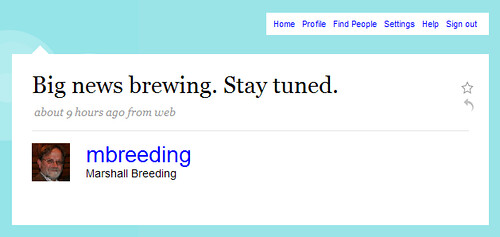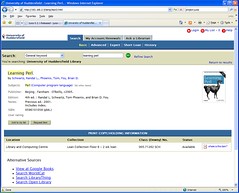I’m guessing it’s safe to post this now, although I’m still expecting a phone call from lawyers representing OCLC and/or The Library Journal after “accidentally” stumbling on the news before it officially broke :-S
The LJ article (written by Marshall Breeding) isn’t live at the moment, but it the annoucement has appeared on the OCLC home pages:
– OCLC announces strategy to move library management services to Web scale
– Andrew Pace: And now for something completely different

Category: Library News
Squeezing Juice into the OPAC
Those who went to either Richard Wallis’ API session or my OPAC session at the UKSG 2009 Conference will have heard about Richard‘s Open Source Juice Project.
The project, which was launched at Code4Lib 2009, is designed to allow developers to create OPAC extensions (or, if you prefer, “bells and whistles”) that, in theory, should be product independent. This is such a genius idea!
Part of the problem with the stuff we’ve developed at Huddersfield is that we had to put an infrastructure in place around the OPAC in order to allow us to do the tweaking — an extra web server, MySQL databases, etc. It works well for us, but it’s not an easily transferable model. I’m always more than happy to share the “how we did it” but, more often than not, the actual code is too reliant on that back end infrastructure.
I need to do a bit more testing, but I’m hoping to have a HIP 3 “metadef” ready soon. The job of the metadef is to define whereabouts on the OPAC page things like the ISBN, author and title appear, and therefore will be different for every OPAC product. However, once you have a suitable metadef for your OPAC, you can start using the Juice extensions to add extra functionality — I had a quick play around last night just to prove that Juice will work with HIP 3…

I’m not sure if this is in Richard’s plans for Juice, but it would be handy to extend the metadef to include other OPAC specific information — e.g. given an ISBN or some keywords, how do you construct a URL to trigger a search on that OPAC. That’d be really useful for embedding recommendations, etc.
Moving and Shaking
Congratulations to all the other Movers & Shakers!

Although I found out a couple of months ago that I’d made the list, I’m still really bemused by it all. Partly because it came out of the blue, but mostly because I can easily think of a dozen people who are infinitely more deserving. However, I’ll gladly try and grab my 5 minutes of fame 🙂
At the risk of doing a “Kate Winslet“, there are lots of people I’d like to thank for getting me to where I am today! Back in 2005, John Blyberg‘s innovative work at Ann Arbor gave me the confidence to start fiddling with our own OPAC. Fortunately, Dynix’s developers had created an OPAC that was fairly simple to tweak and an ILS that was easy to query, so it wasn’t an uphill struggle. (I can’t stress just how important it is that ILS vendors give their customers flexible and extensible products)
Since then, a plethora of people have continued to inspire me (in no particular order and far from complete) — Jenny Levine, Casey Durfee, Tim Spalding, Tony Hirst, Jonathan Rochkind, Helene Blowers, Casey Bisson, Kathryn Greenhill, Michael Stephens, Brian Kelly, Brendan Dawes, Richard Wallis, Phil Bradley, Stephen Abram… and, oh God, who’s the other one?!? 😉
A big “hi” to everyone who puts up with my inane waffling in the LSW chat room — you guys and girls rock! 🙂
An especially big “thank you” to my long suffering friends and colleagues at the University of Huddersfield. I’m extremely fortunate to work in a library that both innovates and inspires innovation. (Did you know Huddersfield had one of the first facetted PACs back in the 1990s? It might not be as well known as NCSUs OPAC, but Dr. Steve Pollitt‘s pioneering HIBROWSE system laid the groundwork for Endeca.)
Finally, another big “thank you” to Iman Moradi and Bryony Ramsden.
Iman’s probably the closest thing we’ve got to a “Superpatron” at Huddersfield and his boundless energy and support for the library never fails to amaze me. This year, he’s got his students playing with library data and creating visualisations — how cool is that?!
Bryony, my partner of 14 years, never seems to mind the endless hours I spend on the PC at home — for that, and many other reasons, I’m eternally grateful to her!
So, to all the unsung Movers & Shakers out there in libraries throughout the world, karma++ 🙂
“Why you can’t find a library book in your search engine”
It’s good to see the ongoing OCLC debacle is starting to be picked up by the mainstream press in the UK — The Guardian newspaper has a large feature in their technology supplement today: “Why you can’t find a library book in your search engine“.
“They are a generation abandoning print and paper”
Interesting article in The Guardian today: “Internet generation leave parents behind“…
- children are spending increasing amounts of their lives in front of televisions, computers and games consoles, cramming in nearly six hours of screen time a day
- from the age of seven, children are building multimedia hubs in their rooms, with games consoles, internet access and MP3 players
- reading books is falling out of favour – 84% said they read for pleasure in 2006, 80% in 2007 and 74% this year
- one in three said the computer is the single thing they couldn’t live without
- pupils are using the internet less while at school, frustrated by the low-tech access and the restrictions put in place to stop them from accessing inappropriate material
- they are a generation abandoning print and paper, and the whole integration of technology and the way they glide from one to the other is seamless
LibraryThing rules!
I’m lost for words, so here a link — “A million free covers from LibraryThing“!
Google Book Search
I think Superpatron Ed might have let the cat out of the bag already, but Google should be making an annoucement about Google Book Search tomorrow that might be of interest to libraries… can you guess what it might be?
ILS rumblings
My spider senses have been well and truly tingled! Rumours are starting to circulate about another major ILS merger/acquisition.
I find it hard to believe that the current ILS marketplace could possibly support another one of these (after the Sirsi & Dynix and Ex Libris & Endeavor mergers) but, then again, I do like surprises 😀
Go Danbury, Go!
Congratulations to Danbury Library in Connecticut for being the first to add LibraryThing for Libraries to their live OPAC!
For anyone wondering if it works with the Dynix/Horizon HIP OPAC, let me tell you that it works a treat 🙂
In completely unrelated news, one of my work colleagues visited Grimsby today. A quick look at Wikipedia and I was able to amaze her with the fact that Grimsby produces more pizzas than anywhere else. Not only that, it looks like Grimsby has been making pizzas since the Dark Ages:

Hmmmmmmm… Medieval Margarita with 6 slices of Mozzarella!